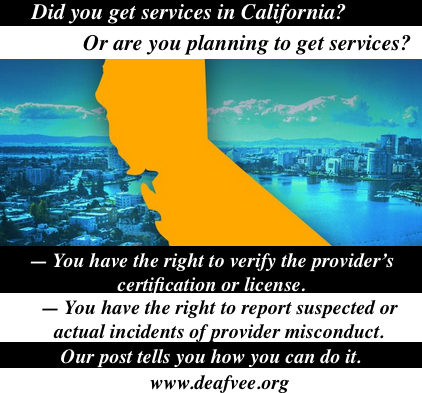Experts state that the risk of suicide is at least two and a half to five times higher for the Deaf community, and it is possibly higher for Deaf community members who are of color or identify as LGBTQ+ (although the exact figures remain to be investigated in empirical research). Kayla Stubbs died from suicide yesterday (1/23/2020) at the age of 29, and the community is reeling in shock from it.
Several of Stubbs’ friends added posts on her Facebook wall to share memories of her and to encourage those who were having thoughts of suicide to seek help. One instance is Tara Leavitt Tatton’s post, where she highlighted the importance of behavioral health services in the Deaf community and the issue of scarcity. It has been said that only two percent of Deaf community members in need of quality behavioral health services are actually able to access them (The National Deaf Center on Postsecondary Outcomes).
It is true that our community members can contact the 24/7 suicide hotline using their videophone, and yet the hotline volunteers tend not to have any prior working experience with us–let alone understanding our culture, our language, and what we face day in and day out. There is another 24/7 suicide prevention hotline available by text message, but our community members do not always prefer to use written English. The difficulty of access to linguistically and culturally appropriate hotlines is one of several factors that contribute to higher rates of suicide within the community.
Most, if not all, psychiatric hospitals also do not have any programs designed in mind for Deaf patients and they often rely on video remote interpreters (VRIs) to serve the patients, which pose numerous liabilities. What follows is just a few of the many issues associated with VRI use. The screen only shows the patient above the torso, so the VRI is at risk of missing critical body language hints from the patient that could be helpful in ensuring an accurate evaluation of the patient. Sometimes glitches occur with the software or hardware components to the point where the video quality suffers, there is a noticeable lag in the video, the interpreter and the service provider is having a hard time hearing each other, or even the network signal is lost and the call disconnects. There are times where the administration will go as far as to dismiss requests from the patients, their families, and/or the advocates speaking on their behalf when it comes to the provision of face-to-face interpreters and consultation with behavioral health personnel who are not familiar with the Deaf communities for diagnosis, treatment, and release.
Even with the shortcomings of the current behavioral health system in serving our community, Tatton emphasizes it is key for you to get immediate help, especially if you have created an action plan and the means to follow through with the plan. Sometimes that may have to mean going straight to the emergency room department at the psychiatric hospital you are closest to.
One in four (25%) of the persons who die from suicide never show any warning signs or mention the thought of suicide to anyone else and, as terrible as it is, there is not much community members could have done to prevent their deaths (Deaf Counseling Center). The other three in four (75%) of persons who die from suicide do show warning signs, and most times others only recognize the signs for what they were after losing their loved one(s) to suicide (Deaf Counseling Center). Signs and symptoms linked with a person who is experiencing thoughts or feelings of suicide can be looked up online. If you want to gain skills in recognizing the signs and symptoms and providing basic interventions, consider signing up for a Mental Health First Aid class.
The National Suicide Prevention Lifeline (available for calls at 800-273-8255 or TTY at 800-799-4889) provides LifeLine, which connects persons with counselors for emotional support and other services, on the web. All chat centers in the Lifeline network are accredited by CONTACT USA. Lifeline Chat is available 24/7 across the United States. You also can text Crisis Text Line at 741741 and type “DEAF” to be connected to a Crisis Counselor who knows and understands your culture and your language.






